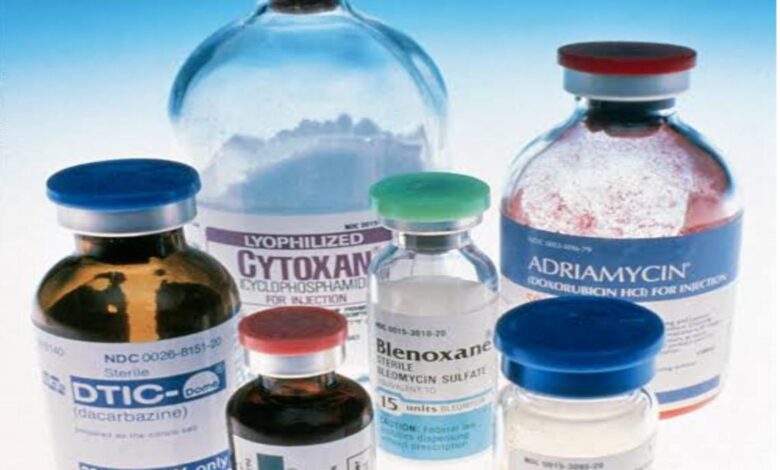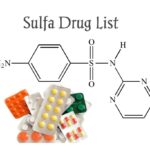Anticancer Drugs: Classification, Mechanism of Action, Side Effects

An anticancer drug, also known as an antineoplastic or chemotherapy drug, is a medication specifically designed to treat cancer. These drugs target cancer cells and aim to inhibit their growth or kill them, helping to prevent the spread and progression of cancer within the body.
The first anticancer drug to be discovered and used in clinical practice was nitrogen mustard. Nitrogen mustard, specifically mechlorethamine, was derived from chemical warfare agents and was repurposed as a cancer treatment in the early 1940s. It was used primarily for the treatment of lymphomas and leukemias.
Since then, numerous other anticancer drugs have been developed. These drugs have different mechanisms of action and target various aspects of cancer cell growth and division.
It’s worth noting that the field of cancer treatment has seen significant advancements since the discovery of the first anticancer drug. Today, more than 100’s anticancer drugs have been discovered and approved by the FDA which have improved the effectiveness and safety profiles of cancer treatments.
Classification Of Anticancer Drugs With Examples
There are several classifications of anticancer drugs based on their mechanism of action and their specific targets. Here are some common classes of anticancer drugs with examples:
1. Alkylating Agents: Alkylating agents work by directly damaging the DNA of cancer cells, preventing them from dividing and growing. These drugs add alkyl groups to the DNA molecule, leading to the formation of cross-links within the DNA strands. This disrupts DNA replication and transcription, ultimately causing cell death. Examples of alkylating agents include Cyclophosphamide, Cisplatin, and Carmustine.
2. Antimetabolites: Antimetabolites are drugs that interfere with the metabolism of cancer cells by mimicking essential substances required for DNA and RNA synthesis. They are incorporated into the DNA or RNA molecule during replication, resulting in errors and preventing further cell division. Methotrexate, 5-Fluorouracil (5-FU), and Gemcitabine are commonly used antimetabolites.
3. Topoisomerase Inhibitors: Topoisomerase inhibitors target the enzymes called topoisomerases, which are involved in DNA replication and transcription. These drugs interfere with the normal function of topoisomerases, leading to the accumulation of DNA strand breaks and preventing the DNA from being properly unwound and replicated. Etoposide, Irinotecan, and Topotecan are examples of topoisomerase inhibitors.
4. Antitumor Antibiotics: Antitumor antibiotics are derived from natural sources, such as bacteria or plants. These drugs work by intercalating into the DNA molecule, causing DNA strand breaks and inhibiting DNA and RNA synthesis. Additionally, they can generate free radicals that damage the DNA. Doxorubicin, Bleomycin, and Mitomycin C are examples of antitumor antibiotics.
5. Mitotic Inhibitors: Mitotic inhibitors target the process of cell division (mitosis) by disrupting the formation of the mitotic spindle or preventing its proper function. This leads to the arrest of cell division and eventual cell death. Mitotic inhibitors are often used in rapidly dividing cancer cells. Examples include Paclitaxel, Vinblastine, and Docetaxel.
6. Hormonal Agents: Hormonal agents are used for cancers that are hormone-dependent, such as breast and prostate cancers. These drugs interfere with the production or activity of hormones that promote cancer growth. For example, Tamoxifen is an estrogen receptor antagonist used in the treatment of hormone receptor-positive breast cancer. Letrozole is an aromatase inhibitor that reduces the production of estrogen, and Leuprolide is a gonadotropin-releasing hormone (GnRH) analogue that suppresses hormone production in hormone receptor-positive prostate cancer.
7. Targeted Therapies: Targeted therapies are drugs that specifically target molecules or pathways that are crucial for cancer cell growth and survival. These drugs aim to selectively inhibit cancer cells while minimizing damage to normal cells. Examples include Imatinib, which is a tyrosine kinase inhibitor used for chronic myeloid leukemia (CML), Trastuzumab, a monoclonal antibody that targets HER2-positive breast cancer, and Bevacizumab, which inhibits angiogenesis (formation of new blood vessels) in various cancers.
8. Immunotherapy: Immunotherapy utilizes the body’s immune system to fight cancer. These drugs stimulate the immune response against cancer cells or target specific immune checkpoints to enhance the immune system’s ability to recognize and destroy cancer cells. Pembrolizumab and Nivolumab are immune checkpoint inhibitors that block the PD-1 pathway, and Rituximab is a monoclonal antibody used to treat certain types of lymphomas.
Each class of anticancer drugs has different mechanisms of action and targets, allowing for a variety of treatment options depending on the specific characteristics of the cancer being treated. It’s important to note that these drugs can have side effects, and the choice of treatment should be made in consultation with a healthcare professional.
Most Used And Highly Effective Anticancer Drugs
The most commonly used and highly effective anticancer drugs:
1. Paclitaxel: It belongs to the class of mitotic inhibitors and is used to treat various types of cancer, including breast, ovarian, and lung cancer.
2. Rituximab: This monoclonal antibody targets CD20 proteins on the surface of B-cells and is used to treat certain types of lymphomas, including non-Hodgkin lymphoma.
3. Trastuzumab: It is a targeted therapy that specifically targets HER2-positive breast cancer cells and is often used in combination with chemotherapy for the treatment of breast cancer.
4. Imatinib: This is a tyrosine kinase inhibitor used to treat chronic myeloid leukemia (CML) and certain types of gastrointestinal stromal tumors (GISTs).
5. Cisplatin: It is an alkylating agent and is commonly used in the treatment of various solid tumors, including testicular, bladder, and ovarian cancers.
6. Methotrexate: It is an antimetabolite that interferes with DNA synthesis and is used in the treatment of various cancers, including leukemia, breast cancer, and lung cancer.
7. Tamoxifen: This hormonal agent is used in the treatment of hormone receptor-positive breast cancer. It works by blocking the estrogen receptors on breast cancer cells.
8. Bevacizumab: It is a targeted therapy that inhibits angiogenesis (formation of new blood vessels) and is used in the treatment of various cancers, including colorectal, lung, and kidney cancers.
9. Pembrolizumab: This is an immune checkpoint inhibitor that blocks the PD-1 pathway and is used in the treatment of several types of cancers, including melanoma, lung cancer, and bladder cancer.
10. Doxorubicin: It is an anthracycline antitumor antibiotic and is used to treat a wide range of cancers, including breast cancer, lung cancer, and lymphomas.
This list represents a selection of widely used anticancer drugs, but it’s important to consult with a healthcare professional for specific treatment recommendations based on individual circumstances.
Side Effects Of Cancer Drugs
Cancer drugs, including anticancer medications, can have various side effects. The specific side effects experienced can vary depending on the type of drug, the dosage, the individual patient, and other factors. It’s important to note that not all patients will experience every side effect, and the severity of side effects can also vary.
Here are some common side effects associated with cancer drugs:
1. Nausea and vomiting: Many cancer drugs can cause nausea and vomiting. This can range from mild to severe. Antiemetic medications are often prescribed to help manage these side effects.
2. Fatigue: Cancer drugs can cause fatigue and tiredness, which may persist throughout the treatment period.
3. Hair loss: Some chemotherapy drugs can cause hair loss or thinning. This can affect hair on the scalp as well as eyebrows, eyelashes, and body hair.
4. Bone marrow suppression: Certain cancer drugs can affect the bone marrow, leading to a decrease in the production of red blood cells, white blood cells, and platelets. This can result in anemia, increased susceptibility to infections, and easy bruising or bleeding.
5. Diarrhea or constipation: Cancer drugs can disrupt the normal functioning of the gastrointestinal system, leading to diarrhea or constipation.
6. Mouth sores: Some chemotherapy drugs can cause sores or ulcers in the mouth and throat, making it difficult to eat and drink.
7. Changes in appetite: Cancer drugs can affect appetite, leading to decreased or increased food intake.
8. Skin changes: Certain medications can cause skin reactions, such as rash, dryness, or increased sensitivity to the sun.
9. Neurological effects: Some cancer drugs can cause neurological side effects, including peripheral neuropathy (tingling or numbness in the hands and feet), cognitive changes (memory problems, difficulty concentrating), or changes in mood.
10. Reproductive effects: Certain cancer drugs can affect fertility in both men and women. In some cases, temporary or permanent infertility may occur.
11. Cardiovascular effects: Some targeted therapies and certain chemotherapy drugs may have cardiovascular side effects, such as high blood pressure, heart damage, or an increased risk of blood clots.
It’s important for patients to communicate with their healthcare team about any side effects they experience. Many side effects can be managed or minimized with appropriate supportive care, medication adjustments, or lifestyle changes. Healthcare providers will work closely with patients to monitor and manage side effects while aiming to achieve the best possible treatment outcomes.
Anticancer drugs Safety
The safety of anticancer drugs is a crucial consideration in cancer treatment. These drugs are powerful medications designed to kill or inhibit the growth of cancer cells, but they can also affect healthy cells in the body, leading to potential side effects. The safety profile of anticancer drugs is thoroughly evaluated through rigorous preclinical and clinical trials before they are approved for use in patients. Here are some key points regarding the safety of anticancer drugs:
1. Clinical Trials: Anticancer drugs undergo extensive testing in clinical trials to assess their safety and efficacy. These trials involve different phases, starting with small groups of patients and gradually expanding to larger populations. Safety data is collected throughout these trials to identify any potential adverse effects.
2. Side Effects: Anticancer drugs can cause a range of side effects, which vary depending on the specific drug and individual patient factors. Common side effects include nausea, vomiting, fatigue, hair loss, changes in blood counts, and increased risk of infection. However, the severity and occurrence of side effects can vary from person to person.
3. Risk-Benefit Balance: The decision to use anticancer drugs is based on a careful evaluation of the potential benefits versus the risks involved. Oncologists consider factors such as the type and stage of cancer, overall health status, and individual patient preferences. The goal is to maximize the therapeutic benefits while minimizing the risks and side effects.
4. Monitoring and Management: During cancer treatment, patients are closely monitored to assess their response to the drugs and manage any side effects that may arise. Regular blood tests, imaging studies, and other assessments are conducted to evaluate the treatment’s effectiveness and detect any potential safety concerns.
5. Individual Variations: Every patient is unique, and their response to anticancer drugs can vary. Factors such as age, overall health, genetic makeup, and the presence of other medical conditions can influence an individual’s tolerance to these medications. Personalized treatment plans and close monitoring help address these individual variations.
6. Research and Advances: Ongoing research and advancements in oncology aim to improve the safety profile of anticancer drugs. Newer therapies, such as targeted therapies and immunotherapies, are being developed to selectively target cancer cells while minimizing harm to healthy cells, potentially reducing side effects.
It’s important to note that the safety of anticancer drugs is continuously monitored even after they are approved for use. Regulatory authorities, healthcare professionals, and pharmaceutical companies actively track and report any new safety concerns that may emerge to ensure patient safety. If you have specific concerns about a particular anticancer drug, it’s best to consult with your healthcare provider who can provide you with the most accurate and up-to-date information.




